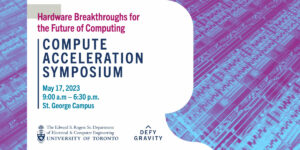
- This event has passed.
Compute Acceleration Symposium
May 17, 2023 @ 9:00 am - 6:30 pm
FreeHardware Breakthroughs for the Future of Computing
Artificial intelligence and machine learning are becoming pervasive in our society, and roadblocks to its continued growth must not be ignored. The energy consumption and costs required to train neural networks in large-scale computing facilities are rising exponentially, which will affect its scalability. To run neural networks on low-power and mobile devices at the edge of the network — such as smart speakers, phones, and vehicles — is proving a challenge. On its current trajectory, hardware cannot keep up with demand.
Where there is need, there is opportunity — and what the future of computing needs is a breakthrough in hardware. The hardware solutions in devices, microsystems and their networks in the near term will use optimized designs that fully exploit the palette of classical physics phenomena. In the long term, quantum computing promises to solve specific problems that are impossible with classical computers.
The Compute Acceleration Symposium will bring together technology leaders and thought leaders to share their perspectives on transformative hardware for future computing. Photonics will play a central role, given that it is a key enabler in novel classical and quantum hardware solutions. The symposium will conclude with a roundtable discussion on how to build a thriving and impactful R&D and commercial ecosystem.
See the day’s schedule and lineup of speakers.
Register for this event. Free for U of T participants.
